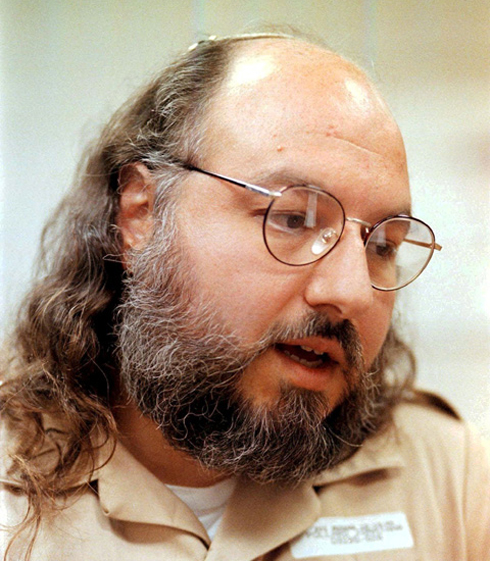
A federal parole board has ruled that Jonathan Pollard, a former US Navy intelligence officer convicted of spying for Israel, will be released in November after serving a 30-year prison sentence, his attorneys said on Tuesday.
Pollard, who has remained jailed for decades despite efforts by successive Israeli governments to secure his early release, will be required to remain in the United States for five years under the terms of his parole, the attorneys said in a statement.
They said he had the assurance of having a job and a home in the New York area, but they nevertheless ask US President Barack Obama to waive that parole requirement and allow him to go to Israel immediately after his release.

Pollard, 60, was sentenced to life in prison in 1987, two years after he was caught trying to gain asylum in the Israeli embassy in Washington.
Under federal sentencing rules in place at the time, he became eligible for parole in November, the 30th anniversary of his arrest. A three-member panel of the US Parole Commission unanimously voted to grant him parole, effective Nov. 21, according to a statement from his attorneys, and the Justice Department did not raise objections to his release.
The parole hearing took place on July 7 at the federal detention center in Butner, North Carolina, where Pollard is incarcerated. Had he been denied parole, his lawyers said, Pollard would have been required to serve an additional 15 years in prison.
"We look forward to seeing our client on the outside in less than four months," said Pollard's lawyers, Eliot Lauer and Jacques Semmelman, in a joint statement.
In a statement issued to the press, Pollard and his wife has asked to be left alone in this sensitive time, saying that after 30 years they wished to be able to return to their normal and quiet lives, which will allow them to rehabilitate the family, while thanking everyone who helped bring this moment to fruition.
"After decades of effort, Jonathan Pollard will finally be released," Prime Minister Benjamin Netanyahu said in a statement. "We look forward to his release."
The decision to free Pollard caps an extraordinary espionage case that stoked public passions. Critics condemned the American as a traitor who betrayed his country for money. Supporters argued that he was punished excessively given that he spied for a US ally.
The US says Pollard provided reams of sensitive and classified information to Israel, including about radar-jamming techniques and the electronic capabilities of nations hostile to Israel, including Saudi Arabia.
A court statement from then-Defense Secretary Caspar Weinberger said Pollard did "irrevocable" damage to the US and had provided the Israelis with more than 800 US classified publications and more than 1,000 classified messages and cables. Portions of the Weinberger document that have been declassified state in part that Pollard admitted passing to his Israeli contacts "an incredibly large quantity of classified documents" and that US troops could be endangered because of the theft.
"He took an oath to support the constitution of the United States, and he failed it," said M.E. "Spike" Bowman, the director of Naval Intelligence at the time of Pollard's arrest. "The fact that he gave it to an ally, that makes absolutely no difference to me. I'm glad that it was an ally rather than the Russians, but what he did makes absolutely no difference."
'No links to Iran deal'
Pollard's attorneys insisted that the decision to release him was "not connected to recent developments in the Middle East."
American officials told the Wall Street Journal on Friday that Pollard's release was planned in the coming weeks or months. The White House was quick to make clear that the parole board would make the decision, and the Justice Department said Pollard would have to finish serving his full sentence.
"Mr. Pollard's status will be determined by the United States Parole Commission according to standard procedures. There is absolutely zero linkage between Mr. Pollard's status and foreign policy considerations," said Alistair Baskey, an NSC spokesperson.
The newspaper's report cited US officials who said they hoped that Pollard's release would help smooth US-Israeli relations, which have been rocky since six world powers recently signed a deal with Iran to limit its nuclear program in return for sanctions relief.
US Secretary of State John Kerry said on Tuesday that Pollard's release was not tied to the nuclear agreement with Iran. "I haven't even had a conversation about it. No, not at all," Kerry told reporters as he left a House of Representatives committee hearing on the nuclear agreement.
White House and other officials have denied that Pollard's planned release is in any way tied to the Iran nuclear deal. And Israeli officials have said while they would welcome Pollard's release, it would not ease their opposition to the Iran agreement.
Pollard has been in American prison for 30 years after being accused of spying for Israel on the Jewish nation's ally.
Recent reports in the Jewish-American publication Algemeiner also cited sources who claimed that Pollard's release was imminent upon the completion of his 30-year sentence in November.
Israel acknowledged that Pollard had been a spy in 1998, requesting a number of amnesty requests – which were rejected. In recent years, reports have repeatedly surfaced regarding Pollard's declining health. It was occasionally reported that the US might release him as a gesture towards Israel, but these reports always proved false.
Former minister Rafi Eitan was the head of Lekem (the Bureau of Scientific Relations) when Pollard was arrested in 1985, and was in essence his handler. Eitan resigned from the intelligence community after Pollard was discovered, Lekem was disbanded, and Pollard and his associates accused Eitan of abandoning him.
Following reports of Pollard's impending release, Eitan told Ynet on Saturday: "Whatever I say, I have no influence on that. Like every Israeli citizen, I hope and believe he'll be freed, but beyond that I have no knowledge of the subject, only a prayer and a plea that he is released."
AFP, the Associated Press and Reuters contributed to this report.

















